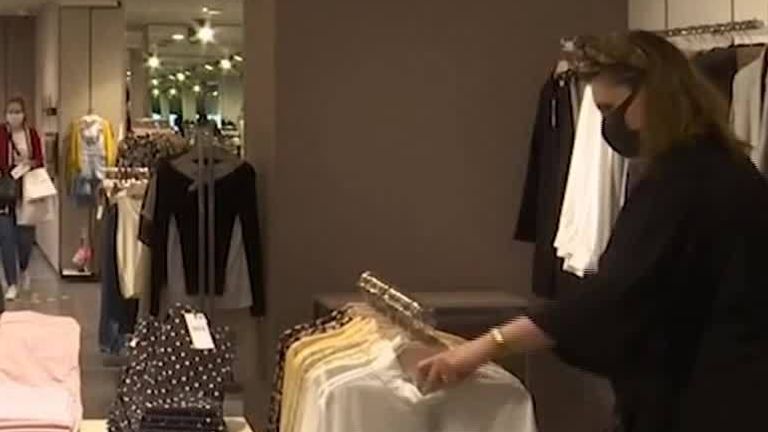Some FTSE 100 companies are expecting their offices to operate at reduced capacity until the middle of next year, Sky News understands.
It comes as business groups, major employers and unions will today receive draft government guidelines setting out how companies can resume working safely when lockdown measures are eased.
The proposals will be at the heart of the government's plan for exiting full lockdown, which will attempt to gradually re-start the economy while keeping the spread of coronavirus suppressed.
Prime Minister Boris Johnson has promised to set out his plan in the coming days, with the deadline for reviewing the current three-week lockdown falling on Thursday.
With many businesses facing restrictions for many months to come the British Chambers of Commerce has urged the government to extend financial support "for the foreseeable future".
Calling for a "bold" approach to tackling the economic challenge, the BCC says the government must "immediately" begin communicating the means by which they can begin reopening.
It has also called for businesses to have clear guidance on their responsibilities for employee safety, and for any easing of lockdown to apply to the country as a whole rather than with regional differences.
In proposals for how to reopen the economy sent to the prime minister, BCC President Baroness Ruby McGregor-Smith said that measures including the employee furlough scheme will have to be prolonged beyond the current end date of June.
"To meet social distancing requirements, some commercial and industrial spaces will operate below capacity and customers may not return immediately for fear of contracting the virus or due to reduced income.
"Businesses welcome the government's cash support for wages and jobs, and the refreshed loan schemes. But to safeguard livelihoods, these schemes must extend and adapt through this period.
"Steps must be taken to incentivise consumer behaviour. And monetary and fiscal policy must remain supportive for the foreseeable future.
"This is a time to be bold. Government should not shy away from sustaining high levels of public spending in order to restart and renew our communities and the economy in the short and medium-term, while not tying the hands of future generations."
Establishing safe working protocols across all sectors of the economy will be central to any exit from the current restrictions, which will also require public transport networks and schools to resume operating in some form to facilitate the return to work.
The Department for Business Energy, Industry and Skills (BEIS) has been consulting with the trade unions, business lobby groups and employers for several weeks to produce plans that will be practical and acceptable to all parties.
BEIS is eager that the proposals be "co-authored" with unions and employers, and that clear guidance will satisfy concerns over where legal responsibility for keeping employees and customers safe falls.
The guidelines will inform what is likely to be a phased return of businesses when the government decides it is safe to release some of the restrictions imposed on 23 March.
Outdoor retail and some offices may be among the first to be allowed to reopen, with customer-facing businesses such as retailers and pubs, entertainment venues, sport and restaurants likely to face a much longer wait.
The central issue for all businesses will be how to accommodate the government's safe social-distancing measure of two metres between colleagues in closed workplaces, and for customers in public-facing businesses like retail.
Where social distancing is not possible employees may be required to wear PPE and enhanced cleaning protocols and access to hand sanitiser will be required for most businesses.
Companies in some sectors, including construction, manufacturing and farming have been able to continue working while essential retailers, largely supermarkets and food shops, have been allowed to remain open.
Some of the lessons they have learned in adopting social distancing will be included in the guidance.
Indoor environments such as offices and call centres will face constraints on space and are likely to have to keep considerable numbers working from home for the foreseeable future.
Avoiding overcrowding on public transport is also a central issue in government planning.
https://news.google.com/__i/rss/rd/articles/CBMigAFodHRwczovL25ld3Muc2t5LmNvbS9zdG9yeS9jb3JvbmF2aXJ1cy1idXNpbmVzc2VzLWFuZC11bmlvbnMtdG8tZ2V0LWZpcnN0LWxvb2stYXQtZ292ZXJubWVudHMtZHJhZnQtcmV0dXJuLXRvLXdvcmstcGxhbi0xMTk4MjMyNtIBhAFodHRwczovL25ld3Muc2t5LmNvbS9zdG9yeS9hbXAvY29yb25hdmlydXMtYnVzaW5lc3Nlcy1hbmQtdW5pb25zLXRvLWdldC1maXJzdC1sb29rLWF0LWdvdmVybm1lbnRzLWRyYWZ0LXJldHVybi10by13b3JrLXBsYW4tMTE5ODIzMjY?oc=5
2020-05-03 03:32:54Z
CBMigAFodHRwczovL25ld3Muc2t5LmNvbS9zdG9yeS9jb3JvbmF2aXJ1cy1idXNpbmVzc2VzLWFuZC11bmlvbnMtdG8tZ2V0LWZpcnN0LWxvb2stYXQtZ292ZXJubWVudHMtZHJhZnQtcmV0dXJuLXRvLXdvcmstcGxhbi0xMTk4MjMyNtIBhAFodHRwczovL25ld3Muc2t5LmNvbS9zdG9yeS9hbXAvY29yb25hdmlydXMtYnVzaW5lc3Nlcy1hbmQtdW5pb25zLXRvLWdldC1maXJzdC1sb29rLWF0LWdvdmVybm1lbnRzLWRyYWZ0LXJldHVybi10by13b3JrLXBsYW4tMTE5ODIzMjY



Tidak ada komentar:
Posting Komentar